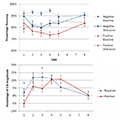Abstract
Emotional information can easily capture our attention compared to neutral information. Evidences suggest that the amount of induced attentional capture is correlated with arousal levels of processed information. On the other hand, the speed (onset latency) of attentional capture seems to be determined by the valence of the emotional information. In this study, the speed of attentional capture between equally high arousing positive and negative stimuli was compared by using the emotion-induced blindness (EIB) procedure, which is suited for measuring temporal changes in attentional effects. In Experiment 1, either a positive or negative word distractor was presented among a rapid stream of neutral words, and a to-be-reported target animal word followed 1, 2, 3, 4, 5, & 8 lags after distractor presentation. In Experiment 2, either a positive or negative distractor was presented among a rapid stream of opposite valence words. The overall results indicate that negative distractors induced a rapid attentional capture response occurring at lags 2 to 4, while positive distractors induced a late attentional capture response, which gradually increased and peaked at lag 5. In conclusion, the emotional valence of distractors determines the speed of attentional capture when compared emotional distractors have similar arousal levels.
